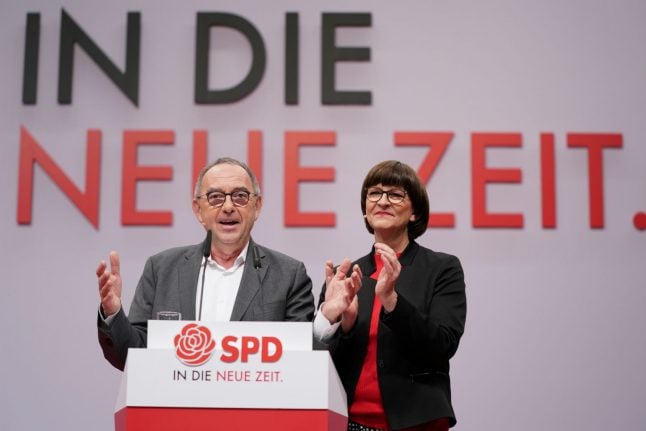“It's bad for Germany when every important decision depends on how the SPD is feeling at that moment,” Annegret Kramp-Karrenbauer, leader of Merkel's CDU conservatives, told the Bild am Sonntag daily.
At a crunch party congress this weekend, the ailing SPD voted against an immediate exit from the government.
READ ALSO: Merkel given reprieve as coalition partner votes not to split
But new leadership duo Norbert Walter-Borjans and Saskia Esken won the party's backing to steer a more leftwing course.
The party backed them to open “discussions” with Merkel's CDU/CSU bloc on demands including a higher minimum wage, more public investment and more climate action.
No timeframe has been given but talks could start as early as this week, according to German media.
If no progress is made, the SPD could call it quits — potentially upending Merkel's plan to complete her fourth term before retiring from politics in 2021.
Kramp-Karrenbauer, seen as Merkel's preferred successor, said she had hoped for a “clearer commitment” from the SPD to continue governing.
She slammed the party for trying to tweak the hard-fought coalition agreement clinched after 2017's inconclusive general elections, pointing out that leadership changes at the CDU and CSU never put the left-right coalition at stake.
“The CDU is loyal to the agreement and I expect the same from the new SPD leadership,” she told Bild.
“I can't accept conditions along the lines of 'If we don't get this, we walk'.”
The secretary general of the CSU, Markus Blume, was equally scathing.
“An SPD on a leftist course won't lead to a government on a leftist course,” he tweeted.
Ein vernünftiges Miteinander mit der #SPD ist uns wichtig. Aber: Eine SPD auf Linkskurs wird nicht zu einer Regierung auf Linkskurs führen.
Rückwärtsgewandte Politik ist mit uns nicht zu machen. In der Sozialpolitik muss es beim Prinzip des Förderns und Forderns bleiben. 1/2— Markus Blume (@MarkusBlume) December 8, 2019
'Absurd'
The CDU's deputy chairman Armin Laschet however was more conciliatory, saying he was willing to discuss the SPD's push to raise the incoming CO2 price from a proposed €10 per tonne.
He said the proposal did not mean a complete reopening of the government's already agreed climate package, which is working its way through parliament and still needs backing from sceptical Green MPs too.
Far more contentious is the SPD's call to invest some €450 billion over the next 10 years in schools, transport and digitalisation projects.
To achieve this, the government would have to stop clinging to its “black zero” policy of maintaining a balanced budget and not taking on new debts — anathema to the CDU and CSU.
READ ALSO: Merkel coalition faces 'stress test' as SPD conference gets underway
Merkel herself just last month touted the “record-high” investments planned in the government's 2020 budget, adding that it was “absurd” to run up new debts.
Weakened by a series of election drubbings, the SPD is hoping to sharpen its profile with the list of demands.
But if the upcoming talks fail, Germany faces the rare prospect of snap polls or a Merkel-led minority government.




 Please whitelist us to continue reading.
Please whitelist us to continue reading.
Member comments